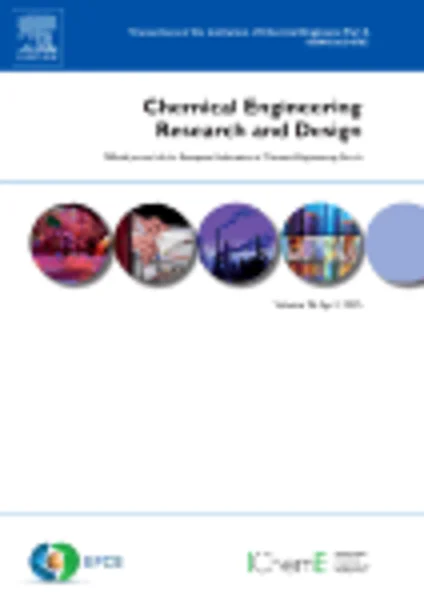-
process intensification and waste minimization in liquid–liquid–liquid phase transfer catalyzed selective synthesis of mandelic acid
جزئیات بیشتر مقاله- تاریخ ارائه: 1392/07/24
- تاریخ انتشار در تی پی بین: 1392/07/24
- تعداد بازدید: 753
- تعداد پرسش و پاسخ ها: 0
- شماره تماس دبیرخانه رویداد: -
conversion of biphasic reactions into triphasic reactions can lead to process intensification, waste minimization and selectivity enhancement. unlike liquid–liquid (l–l) ptc, the liquid–liquid–liquid phase transfer catalysis (l–l–l ptc) offers high order of intensification of rates of reaction and catalyst reuse. the rate of reaction is remarkably enhanced by the catalyst-rich middle phase, which is the main reaction phase. separation of catalyst can be done easily and the separated catalyst can be reused several times by using l–l–l ptc. this leads to waste minimization and other benefits of green chemistry. mandelic acid and its derivatives are used for their dual activities as antibacterial and anti-aging agents. in this work, mandelic acid was produced by l–l–l ptc reaction of dichlorocarbene with benzaldehyde. dichlorocarbene was generated in situ by the reaction of chloroform and sodium hydroxide in the presence of poly ethylene glycol (peg) 4000 as the catalyst. the selectivity to mandelic acid was 98%. the reaction mechanism and kinetics model were established to validate the experimental data.
مقالات جدیدترین رویدادها
-
استفاده از تحلیل اهمیت-عملکرد در ارائه الگوی مدیریت خلاقیت سازمانی و ارائه راهکار جهت بهبود
-
بررسی تاثیر ارزش وجوه نقد مازاد بر ساختار سرمایه شرکت های پذیرفته شده در بورس اوراق بهادار تهران
-
بررسی تأثیر سطح افشای ریسک بر قرارداد بدهی شرکت های پذیرفته شده در بورس اوراق بهادار تهران
-
بررسی تأثیر رتبه بندی اعتباری مبتنی بر مدل امتیاز بازار نوظهور بر نقد شوندگی سهام با تأکید بر خصوصی سازی شرکت ها
-
تأثیر آمیخته بازاریابی پوشاک ایرانی بر تصویر ذهنی مشتری پوشاک ایرانی (هاکوپیان)
-
بررسی خصوصیات مقاومت برشی و کششی بتن معمولی، بتن خودتراکم و بتن خودتراکم سبک
-
بررسی دینامیکی پایداری دیواره ی گود حفاظت شده به روش میخ کوبی تحت اثر زلزله حوزه نزدیک و دور از گسل به روش اجزاء محدود
-
a concise synthesis of enantiomerically pure aroyl-l-alanines and dihydroaroyl-l-alanines
-
efficient near-infrared spectroscopic calibration methods for pharmaceutical blend monitoring
-
vanadium containing heteropoly molybdates as precursors for the preparation of mosingle bondvsingle bondp oxides supported on alumina catalysts for ammoxidation of m-xylene
مقالات جدیدترین ژورنال ها
-
مدیریت و بررسی افسردگی دانش آموزان دختر مقطع متوسطه دوم در دروان کرونا در شهرستان دزفول
-
مدیریت و بررسی خرد سیاسی در اندیشه ی فردوسی در ادب ایران
-
واکاوی و مدیریت توصیفی قلمدان(جاکلیدی)ضریح در موزه آستان قدس رضوی
-
بررسی تاثیر خلاقیت، دانش و انگیزه کارکنان بر پیشنهادات نوآورانه کارکنان ( مورد مطالعه: هتل های 3 و 4 ستاره استان کرمان)
-
بررسی تاثیر کیفیت سیستم های اطلاعاتی بر تصمیم گیری موفق در شرکتهای تولیدی استان اصفهان (مورد مطالعه: مدیران شرکتهای تولیدی استان اصفهان)
-
سالمندشناسی اسلامی، ضرورت بومی سازی دانش سالمندی در ایران با مروری بر آیات و احادیث
-
بررسی تأثیر مفهوم توسعه پایدار در فلسفه تکنولوژی مارتین هایدگر بر معماری بازیافتی مایکل رینولدز
-
تحلیل تنظیم گری، خصوصی سازی در ایران
-
studying the role of traffic flow control methods in freeways and its effect on drivers' behavior
-
social media usage: positive and negative effects on the life style of indian youth




سوال خود را در مورد این مقاله مطرح نمایید :